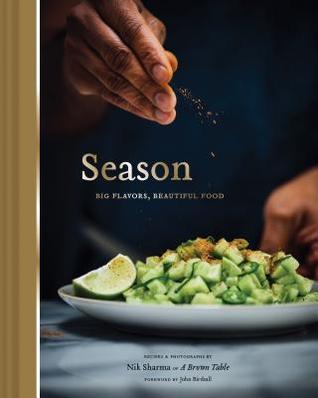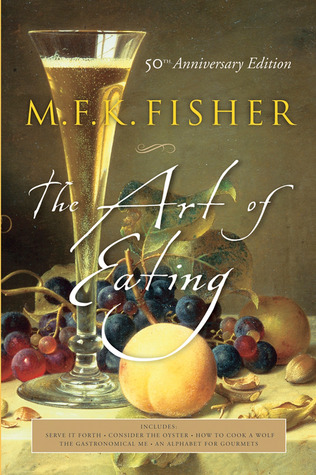
Chef, writer, and cookbook author Samin Nosrat's first book Salt, Fat, Acid, Heat: Mastering the Elements of Good Cooking not only found critical success, it also landed Nosrat her own Netflix show.
Nosrat, who worked her way up from busser to chef at the famed restaurant Chez Panisse, recently stopped by the Goodreads office to talk about her love of poetry, and how fellow author Michael Pollan (who wrote the forward in her book) encouraged her career.
She also shares some of her go-to food books and what’s next for her. An edited version of the conversation is below.
Goodreads: Tell me about little bit about yourself and how you became a cookbook author.
Samin Nosrat: I started cooking sort of by accident around the year 2000. I was a busser at Chez Panisse restaurant and I was so interested in cooking that I begged them to teach me.
But before that, I went to college [Berkeley in ‘97] with the ambition of being an English major. My aunt, who was kind of a big sister to me, worked at the school library part time in college, so I wanted to be a librarian. And my mom always read to me, so books were my everything from the youngest age.
So even though I had different ambitions at different points, I just wanted to make books. It seemed like the most magical thing in the world. And cooking sort of accidentally happened.
In 2006, I audited a class with Michael Pollan at the Journalism School because I've looked up to him since I read The Botany of Desire and I felt like he was such an important and amazing advocate for the things in the food system that I cared about. I was also introduced to this amazing community of young journalist and writers.
I already had this idea of salt, fat, acid, and heat being the basic philosophy of cooking—this universal philosophy. Michael noticed I was always talking about these four elements and every week I would bring him terrible book ideas and eventually he was like, “This is your book.”
Goodreads: What were some of the influences in writing a cookbook?
Samin Nosrat: I’ve always loved books, as much as cookbooks. There are absolutely a lot of strong cookbook influences, including a lot of the sort of “20th century grumpy cookbook ladies”—Jane Grigson,Elizabeth David, M.F.K Fisher, all these women who wrote about food in both an incredibly sensual and an incredibly practical way.
When I came to Chez Panisse and I wanted to come to the kitchen, I knew nothing about cooking, so the chefs gave me a long list of hurdles—one bigger than the last—to try to discourage me from entering the kitchen. At one point, they were like, “You need to read all these books, these are all the books that have been the foundation of our kitchen and you need to understand them before you can understand us” (You can find that list of books here). So there’s already this literary and sensible cookbook tradition that I wanted to follow.
My friend Tamar Adler had just published her first book called An Everlasting Meal which was so beautiful and well written. In some ways I just tried to be Tamar. Also, I was a very dedicated student of Michael’s. I’ve always loved the way he can take a very complicated topic, spend time within it, come to understand it and write about it very simply using the classic sort of experiential journalism where he goes on this journey of learning about something. He's not talking down to you because he’s a newbie too.
So when I sat down to write, I actually tried to do that. But I realized I had to write from a place of authority. When I was teaching my classes I found that a lot of what landed with [my students] was when I told stories of my own mistakes and my learning from my mistakes. So, while I realized I had to write from a place of authority, I could use the stories of being a beginner and make it approachable and accessible and remember what it feels like to not know anything about cooking and how scary and intimidating that can feel.
I also studied poetry in college. I’ve always loved poetry and there’s a lot that’s poetic about food writing and recipe writing. So anywhere I could sneak in poetry, I did. I quoted a lot of poets, there are a lot of sneaky poetry references. It was a joy for me to work those in.
Goodreads: Could you share a favorite poetry book and a favorite food book?
Samin Nosrat: There’s this incredible book called The Hungry Ear: Poems of Food and Drink and it’s a book of food poetry that’s edited by Kevin Young. I continue to refer to that a lot. I referred to that a lot in the book because he went through the history of English language poetry and found all these incredible poems that use food references.
And a food book, I think Tamar Adler’s An Everlasting Meal was a very formative book.
Goodreads: In the cookbook world, are there any books you’re really excited about or cooking from?
Samin Nosrat: I love Season: Big Flavors, Beautiful Food by Nik Sharma. He has such an incredible personal journey and he has just a wonderful way with spices and flavors.
There is a book I love called You and I Eat the Same: On the Countless Ways Food and Cooking Connect Us to One Another that’s put together by Chris Ying (who was an editor at Lucky Peach for a long time)—it’s doing what I want to do, which is show you that good food around the world is more similar than it is different and humans are more similar than we are different. And that I think is a really beautiful, unifying thing.
I also just love The Joy of Cooking and Alice Waters’ The Art of Simple Food: Notes, Lessons, and Recipes from a Delicious Revolution and always recommend that to people. Julia Turshen has this fun book right now which is called Now & Again: Go-To Recipes, Inspired Menus + Endless Ideas for Reinventing Leftovers “Now and Again”—she almost named it “Hello it’s Me Again!” about leftovers, I really love that.
Goodreads: So you have had so much success from the Netflix series and the cookbook. Can you tell us one or two really meaningful experiences you’ve had from this?
Samin Nosrat: Just people cooking with their kids, people emailing me that their kids are eating green beans and they never ate their vegetables before because now they’re using salt in the water. The first time they ever roasted a chicken. The meaningful thing to me is that I wanted this to make people feel they could cook. To make people want to cook and to make people cook. Cooking is something I enjoy and care about it, but it’s ultimately about people.
Goodreads: Finally, we would love to know what’s next for you!
Samin Nosrat: I definitely want to write another book. I’m too scrambled eggs, I’m slow. I sometimes look at friends— like author Mary Roach who works in my office (I work in this awesome office with all these amazing writers!) and Mary cranks out like a book a year. I’m just never going to be that person, I’m slow and crazy and thorough and obsessive, and one isn’t better than the other, I just know I’m not that other thing. So, I think it’s going to take me a while. I’m circling around a couple ideas. I think if this one (Salt, Fat, Acid, Heat) is "how to cook," I think the next one will be "what to cook."
What are some of your favorite food books? Let us know in the comments!
Check out more recent blogs:
17 Parent-Recommended Books to Help With Common Challenges
21 Hot Picks from Book Editors to Start a Great Year of Reading
7 Great Books Hitting Shelves This Week
posted by Montse on January, 23
from Goodreads Blog http://bit.ly/2CIXS9h
via IFTTT










No comments:
Post a Comment